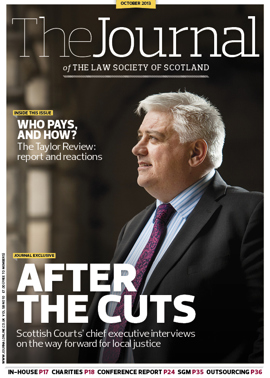Opinion column: Stephen Gold

Richard Susskind brings great originality, energy and rigour to thinking about the future of law. So when he portends exponential leaps in the power of technology, alternative providers invading like orcs, the triumph of the supermarket over the corner shop, and thus a gloomy future for high street practice, he deserves to be taken seriously. But as George Gershwin noticed, and indeed Richard acknowledges, it ain’t necessarily so.
Predicting the future is a high-risk business, as betting shop aficionados and the inventors of Betamax will confirm. I believe there can be a good future for high street law, but it will not resemble the present.
My starting point is that for most people, the essentials of a legal service are information, facilitation, affordability, and an empathetic human relationship with someone they trust. Not all matters require the last, but many always will, and even the most commoditised service is enhanced by it. Technology matters hugely, but so does biology.
I invite you to look across the Pond, first to LegalZoom, the provider of online legal documents and America’s best known legal services provider with 60% name recognition, and then to the law firm Jacoby & Meyers, the next best known. LegalZoom’s founders believed initially that providing documents alone would suffice, but experience has taught them that once customers have downloaded, often they want to talk to a local, affordable, reputable lawyer and take further advice. In retail parlance, they want bricks and clicks.
LegalZoom’s strategy has evolved, and they have created a network of affiliate firms. The way these affiliates work and charge could not be less traditional – an online initial interview, fixed fees, and face-to-face work only if needed, with a share of fees going to LegalZoom in all cases. Yet there is no shortage of willing firms. They have adapted their resources, methods, cost bases and fee structures to serve clients in these innovative ways and make a profit. In return, they benefit directly from LegalZoom’s marketing clout, which they could not replicate on their own.
Jacoby & Meyers’ first office, opened in 1972, was a small store in a deprived area of Los Angeles. Thanks to extensive advertising and a host of service innovations, they have become America’s largest full-service consumer law firm, combining a strong online offering, including document download and online case evaluation, with a prominent physical presence across the country.
These businesses have succeeded by delivering what clients want – advice which is expert, accessible and responsive, with affordable, predictable costs. How does our high street compare? We do well on expertise, but what about the rest?
Take accessibility: one can book a table in any restaurant, or organise a trip round the world, from the sofa 24/7, but try arranging to see a lawyer other than 9-5.30 on weekdays. Online appointment systems are cheap, convenient for clients, nothing new, yet practically unknown in law firms.
As for responsiveness, though Skype and FaceTime, for example are free, how many firms offer clients the convenience of consulting quickly and easily “face to face” without leaving their home or office? Virtually (as it were) none. On costs, compare LegalZoom’s “Build a history with your attorney. Discuss as many matters as you want for one fixed monthly fee”, or the fixed price transparency offered by UK new entrants such as Brilliant Law and Riverview Law, with the opacity of our high street and its love of “it all depends” in so many matters.
Innovations like these are the present, not the future, and they are just the start. But crucially, they are as available to established firms as to new entrants, as is the power of the web, which has opened countless markets to businesses who would never otherwise reach them. With one important exception, cost is no barrier. The real barriers are fear, lack of imagination and inertia.
The exception is that if high street firms are to compete with the marketing power of cash-rich new entrants, they too will need significant capital. Consolidation is bound to accelerate, as firms merge and/or form networks to share resources, create economies of scale, attract investment themselves, and equip themselves for battle.
Not all will survive; extinction is part of evolution. But the best high street firms are not without weapons: strong local roots; public trust in the solicitor brand; expertise; relatively low cost bases; a desire to serve. With an entrepreneurial spirit and the best of new practice, they too can continue to thrive.
In this issue
- Jewel in the crown, or just red tape?
- In the public interest
- Sweeney: room for manoeuvre
- Lost in translation?
- EU Fundamental Rights Agency: the missing link?
- Reading for pleasure
- Opinion column: Stephen Gold
- Book reviews
- Profile
- President's column
- FM officially opens new MBH
- Feeling the squeeze
- Litigation: a numbers game
- Mythbusting! The in-house IT top ten
- Charities and the changing legal landscape
- Heir finding: the sensitive side
- Sign up to boost charity giving
- Law, but not as we know it
- All the permutations
- The truth, the whole truth...
- Shale gas: a complex process
- Expenses up to date?
- Scottish Solicitors' Discipline Tribunal
- Room at the top?
- Here comes the flood?
- SGM decision kills "sep rep"
- Outsourcing: the straight and narrow
- How not to win business: a guide for professionals
- Properly engaged?
- Ask Ash
- Sep rep: what now?
- From the Brussels office
- Law reform roundup






